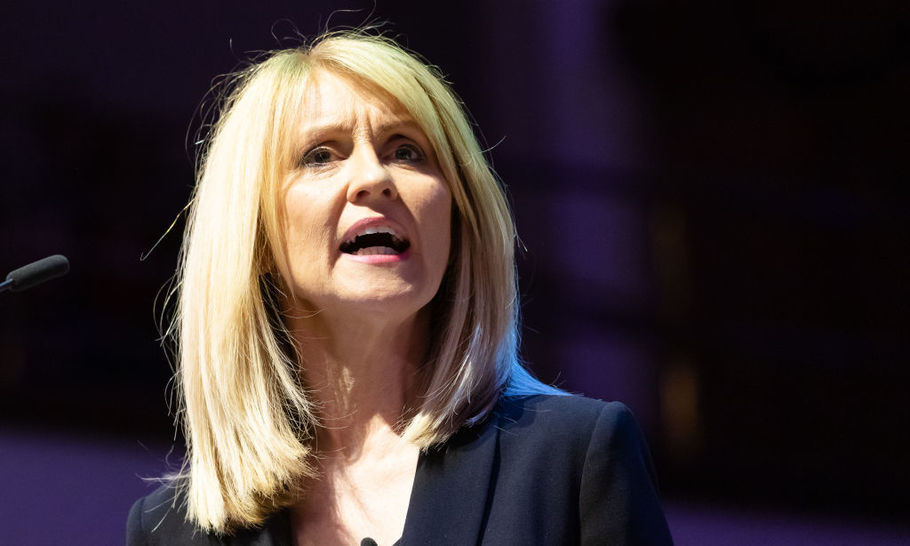Esther McVey's comments on LGBT education were far from homophobic

Vickie Flores/In Pictures via Getty Images
Esther McVey has suffered a rough few weeks. Her personal photographer expenses were exposed, Lorraine Kelly cast shade her way, and then she fared pretty poorly in the first round of the Conservative leadership bid. What I wouldn’t give to be McVey’s therapist. But a recent McVey controversy for which she received unjustified backlash came when she defended the right of parents to have the final say on the relationships education of their child.
In response to McVey’s support for parents knowing best, Justine Greening tweeted that “you can’t pick & choose on human rights & equality.” At first reading, it’s not clear that Greening disagrees with McVey’s remarks. On the contrary, the Universal Declaration of Human Rights states that parents have the “right to choose the kind of education that shall be given to their children”. McVey clearly upholds this, and does not “pick & choose” which human rights she defends. The new Relationships Education guidelines, however, state that “there is no right to withdraw from Relationships Education”, thereby denying the parental right of having the final say.
Greening suggests McVey’s views threaten the LGBT community. Greening’s pick ’n’ mix bag includes LGBT advocacy, but leaves parents’ rights on their child’s education behind. Greening, in other words, falls victim of exactly what she accused McVey. McVey’s defence of parents’ rights, however, is not antithetical to the promotion of equality for all.
The compatibility of the two principles needs stressing. McVey was criticised widely for supposedly resisting the “ modern and diverse Britain ” of today. TheArticle contributor Charlotte Henry added her voice to the chorus of condemnation. In her piece, Henry claims that advocating for the stance that “parents know best” poses possible “harm” to those identifying as LGBT. Quite frankly, non sequitur.
The stances of those like Henry and Greening fail to comprehend that a significant difference exists between homophobia (bad), and believing parents should be able to withdraw their children from lessons they deem age, or content, inappropriate (good). It is scaremongering to suggest that parents wishing to withdraw their children from lessons teaching about non-traditional family structures would fail to instil in their children the importance of treating those who identify as LGBT with dignity and respect.
Since parents bring children into the world, the duty falls to them to cater for their child’s full emotional, moral, and intellectual development. Some of this duty may be outsourced to the likes of schools, nurseries, and other family members, but the task falls primarily with the parent. When dealing with education on family matters, it is only appropriate that families have the final say. To impose any policy contrary to this deprives parents of fulfilling their responsibilities to their children. Further, it tends towards a tyrannical system wherein citizens are required to publicly voice their support of principles irrespective of whether parents, religion, or current research informs them otherwise. To support the freedom of religion requires one to support the right of parents to raise their child in accordance with the teachings of that religion, or as they see fit.
A New York Times Op-Ed from 2011 asks whether governments should “force parents to send their children to classes that may contradict their moral and religious values,” adding that “liberals and conservatives alike should say no.” Sadly, the new curriculum affords no basic freedom. The new curriculum, to be rolled-out September 2020, dictates that all primary school children must be taught that all varieties of family structures are just as “healthy” as others. This holds no regard for key tenets of many leading religions. Moreover, it disregards extensive research showing children flourish best when brought up by a mother and father, and even more so when the mother and father are married to each other .
To hold this view does not deny that same-sex, unmarried, or divorced couples do not love and care for their children. Rather, it highlights that all family structures do not serve a child’s emotional, mental, and spiritual needs equally. To argue otherwise undermines the efforts of those asking men to take greater responsibility when they unexpectedly become fathers, belittles a child’s emotional struggles when her parents divorce, ignores the difficulties of a single father raising a daughter without a present mother, and threatens to disregard entirely the challenges children face in the absence of one or both parents.
McVey’s comments should not alarm LGBT activists. Rather, we all should be concerned that an attempt to stand up for a basic human right was so widely condemned. Esther McVey has made some blunders this past month. Defending parents’ rights? That ain’t one of them.





